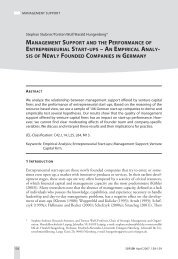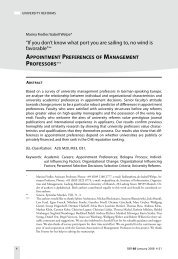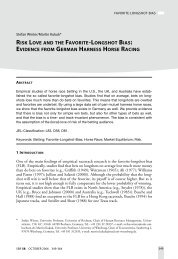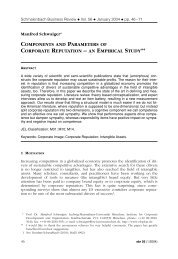“business development”? − the case of biotechnology - sbr ...
“business development”? − the case of biotechnology - sbr ...
“business development”? − the case of biotechnology - sbr ...
Create successful ePaper yourself
Turn your PDF publications into a flip-book with our unique Google optimized e-Paper software.
S. KIND/D. ZU KNYPHAUSEN-AUFSESS<br />
“What we usually conduct is a balance <strong>of</strong> arguments, where <strong>the</strong> plus arguments<br />
are matched with <strong>the</strong> minus arguments – <strong>the</strong> arguments are additionally<br />
weighted. We do not have a ranking, but we try to manage <strong>the</strong> balance <strong>of</strong> <strong>the</strong><br />
arguments. This is our method: If you had two or three arguments, you could say<br />
1 is better than 2 and 2 better than 3 and <strong>the</strong>n one would prioritize who to speak<br />
to first.“ (Mice & More)<br />
“When you start [as a biotech company] your wish is to generally find any partner.<br />
Once <strong>the</strong> development <strong>of</strong> <strong>the</strong> company continues, you have <strong>the</strong> desire to make<br />
better deals, where you get more money. Additionally, <strong>the</strong> wish <strong>of</strong> keeping product<br />
rights comes up. You analyze <strong>the</strong> partner to find out which product rights<br />
result from <strong>the</strong> partnering. [...] Currently, we are at <strong>the</strong> point where we are able to<br />
demand product rights.“ (GPC)<br />
“There is definitely a ranking in which you want chose <strong>the</strong> pharmaceutical companies,<br />
yet <strong>the</strong> luxury to be able to chose is ra<strong>the</strong>r seldom.“ (Xerion)<br />
Negotiation “[…] Once again, <strong>the</strong>re are two phases <strong>of</strong> negotiation to be considered: The first<br />
phase contains creating concern, presenting and attracting partners, which might<br />
be <strong>the</strong> hardest <strong>of</strong> <strong>the</strong> two. The second phase is about defining <strong>the</strong> deal terms. […]<br />
To get <strong>the</strong> best out <strong>of</strong> a convinced partner and work out <strong>the</strong> win-win is more a<br />
legislative or contractual aspect. You play <strong>the</strong> game “who pays first, loses” – which<br />
has certain rules you have to know.“ (NOXXON)<br />
“Normally you reach an agreement quite fast during negotiations. If you take a<br />
look at <strong>the</strong> deals in <strong>the</strong> last 10 years, you find a very small margin regarding royalties,<br />
up-fronts, milestones. This is not really a secret.“ (NOXXON)<br />
“The negotiations can take anywhere between four weeks, which is very fast, up<br />
until several months. I would say three to four months; this means here you have<br />
a term sheet. Usually, it takes a bit longer until <strong>the</strong> closure <strong>of</strong> <strong>the</strong> deal, as you have<br />
to negotiate <strong>the</strong> contracts. They say a good deal needs nine months. This is just<br />
like a good pregnancy. But it is difficult to generalize, we have had deals which<br />
have taken even longer.“ (Wilex)<br />
In <strong>the</strong> fi rst step, <strong>the</strong> identifi cation <strong>of</strong> development options, business developers use many<br />
information sources to identify opportunities. On <strong>the</strong> one hand, <strong>the</strong>re are publicly available<br />
data sources, such as newspapers, <strong>the</strong> internet, or industry reports that BD teams<br />
can use for screening <strong>the</strong> market. Th ey can supplement <strong>the</strong>se sources by using proprietary<br />
databases, such as ADIS, IDDB, or Pharmalicensing. However, <strong>the</strong>se databases are relatively<br />
expensive, in fact, too expensive for several our <strong>case</strong> study companies (e.g., Curacyte,<br />
Jerini). O<strong>the</strong>r <strong>case</strong> study companies (e.g., Bi<strong>of</strong>rontera, Wilex) have access, but see<br />
<strong>the</strong>se databases merely as something “nice to have.” Overall, <strong>the</strong> screening <strong>of</strong> all <strong>the</strong>se data<br />
sources is a time- and money-consuming process, but it is part <strong>of</strong> <strong>the</strong> homework everybody<br />
in <strong>the</strong> fi eld has to do.<br />
188 SBR 59 April 2007 176-199






